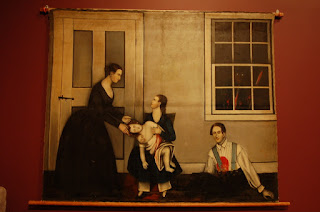THE GOLD BIBLE COMPANY
“The God of Heaven, that all-wise Being, could never have delivered such a farrago of nonsense to the world.”- Eber D. Howe, “Mormonism Unvailed” [sic] 1834
The Maryland scribe Witham Marshe, wrote in his journal that the residents of Lancaster in 1744 were, “chiefly High-Dutch [German], Scotch-Irish…[and] unbelieving Israelites…The spirit of cleanliness has not as yet in the least troubled the major part of the inhabitants; for, in general they are very great sluts and slovens.” Jack Hodges was yet to be born, but his parents may very well have joined Marshe, witnessing the parade of Delaware and Six Nations warriors coming to their town. Due to the filthy conditions in his hotel room, Witham Marshe only got a couple of hours sleep as he and his traveling companion, Rev. Thomas Craddock, were repeatedly “attacked by Dutch fleas and bugs.”
Around two pm the next day, as Marshe and Craddock attended an official luncheon at the courthouse, the members of the Six Nations, “to the number of 252,” began streaming into Lancaster. Shirtless Iroquois men and women on horseback with children trailing on foot, followed by dogs and a herd of cows, formed a raucous parade past the courthouse. Heavily armed with “their fire-arms and bows and arrows, as well as tomahawks,” led by their Onondaga chief Cannasateego, and the omnipresent Palatine German interpreter, Conrad Welser, the tribes set up camp in a field behind the courthouse, unpacking deer hides and teepee poles, readying for the crucial treat (treaty).
Attending to the Christian needs of Lancaster, Rev. Craddock, held an Anglican Sunday service in the courthouse. Despite there being a stone Lutheran church, and log Dutch Calvinist church (with a broken organ), there was no Anglican church in town. So Thomas Craddock improvised; holding an ecumenical service in the courthouse that any Indian, apostate, slave, or Jew, could attend.
With their hotel room left unattended, a couple of belligerent fur traders, just back from Canada, stinking drunk, and without lodging, took over the bedbug ridden room of Marshe and Rev. Craddock. Luckily the front desk interceded before blood was spilled. As Marshe puts it, “these scoundrels quit their beds, and leave the parson and myself in quiet possession.” The hotel management dutifully washed the linens and flipped over the mattresses. The clerk and the cleric would finally have a good night’s sleep.
Rev. Ezra Fisk sworn
By the D.A.:
Q. Are you a clergyman?
A. I am the Presbyterian clergyman of this village.
Q. Have you visited the gaol?
A. I was sent for by Jack, soon after his confinement, and visited in the character of the divine, and have seen him almost every week since. He said that he expected shortly to die, and wished to prepare for the solemn event. He has at times related detached parts of his story to me. I have heard the whole of his testimony in court and think all his relations coincide. I have endeavored to impress on his mind, the importance of relating the whole truth and nothing but the truth.
Rev. Charles Cummings sworn:
By the D.A.:
Q. Do you know Jack Hodges?
A. I have known him since April 1813 when he came to live with me. He was in my employ more than a year. I discharged him for intemperance.
Q. Have you conversed with him since he has been confined in the prison?
A. I have visited him several times, and heard him relate the circumstances and matter of the murder, and as far as my recollection serves me, his story comported in substance with his testimony in court.
Jack found work on Rev. Cummings’ farm from the fall of 1813 through the next winter. He cut wood, thrashed grain, milked cows, fed chickens and hogs, cleared fields, fixed whatever needed fixing, slaughtered whatever needed killing, and drank his fill (much to the parson’s dismay). He ate regularly. His years on board ship hadn't yet crippled him so he was strong and even getting a little fat. It wasn’t long before his “sailor” habits got the better of him, and he was politely asked to leave. Jack’s volatile flip of personality when drinking had become an issue for the quiet, temperate, pastor.
Going to Sunday “meeting” was a big part of life in Goshen and Sugar Loaf and Rev. Cummings regularly brought Jack along. Initially, church attendance was compulsory for the slaves of New York State. With more free blacks moving into the area, the white congregations had begun drawing the color line on a case-by-case basis. Obligatory attendance for slaves may have preceded segregation in Orange County churches, but for a recently manumitted individual, the constantly shifting rules were unclear. You have to go to church? You can’t go to church?
In Goshen and Sugar Loaf, Rev. Fisk’s Presbyterians and Rev. Cummings’ Christian missionaries were, if not welcoming to Jack, at least not exclusionary. Jack was solemnly accepted as a “Christian challenge,” a “bad case,” ripe for redemption from drink and “profane swearing.” As it turned out, the reformists and the sabbatarians didn’t do such a good job with the “dissolute seaman.”
Now that Jack was a very repentant murderer and condemned to die for his crime, it was his immortal soul that was up for grabs. The congregations of Goshen and Sugar Loaf had one last chance. Better late than never. The reverends promptly went into love mode. Out in the pews, much of what got the church gossip’s tongues wagging wasn’t the murder but the sin, the unmentionable, the “delicate state” of Teed’s wife Hannah. It took a lot of rum and a lot of convincing to get Jack Hodges to pull that trigger. Everyone said Mrs. Teed provided both at her husband James’ still house—and son Charlie’s bedroom. To the gossips, Jack was more than a swearing, drinking, homicidal sailor….. he was the forbidden fruit.

Comments
Post a Comment